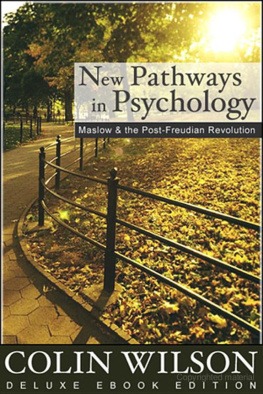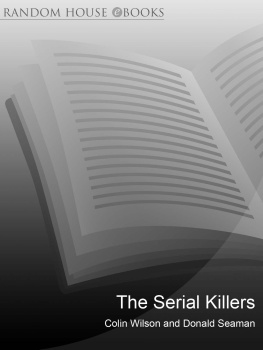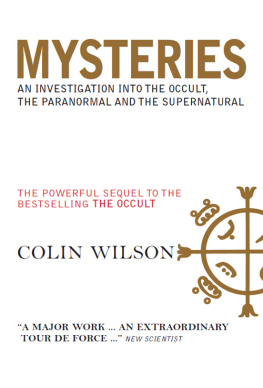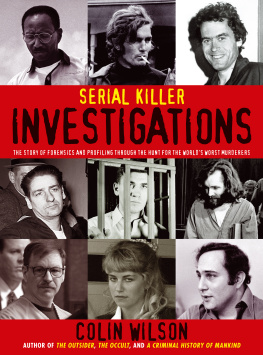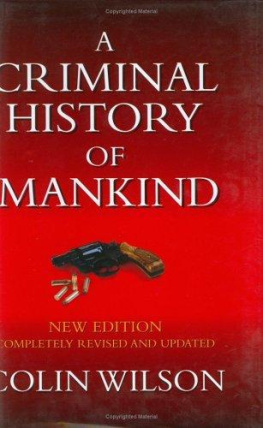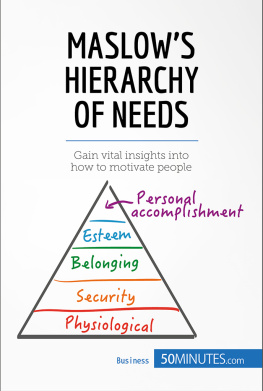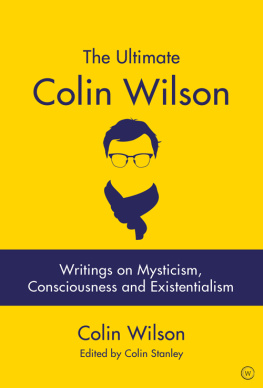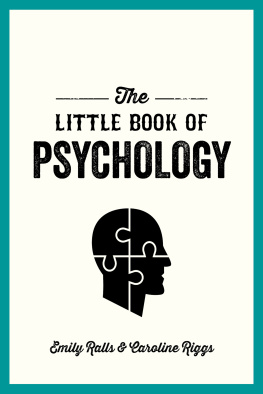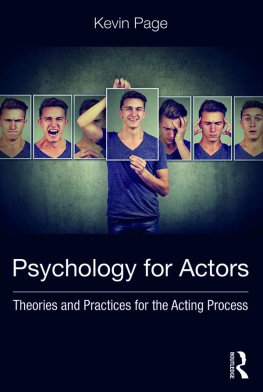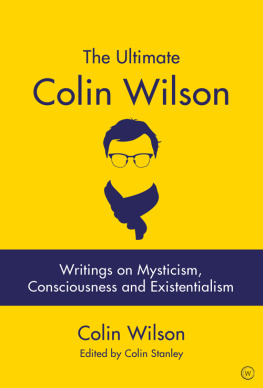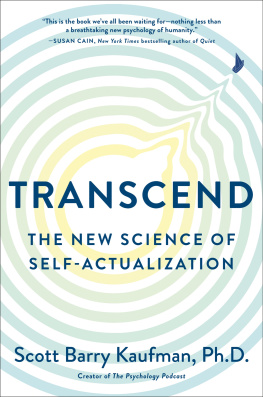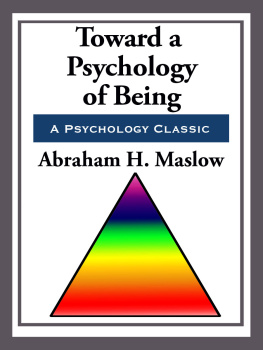New Pathways in Psychology: Maslow and the Post-Freudian Revolution. Copyright 1972, 2001 by Colin Wilson. Contribution by Michael Pastore is Copyright 2001 by Zorba Press. All rights reserved. No part of this ebook may be reproduced or copied in any form without permission from the publisher, Maurice Bassett: Info@ReinventingYourself.com
Colin Wilson asserts the moral right to be identified as the author of this work.
ISBN 0-9760402-1-2
Published by Maurice Bassett Publishing
http://www.ReinventingYourself.com
Electronic Books by Abraham Maslow
http://www.AbrahamMaslow.com
Abraham Maslow Bibliography
http://www.Maslow.com
Produced by Zorba Press
http://www.ZorbaPress.com
Cover art by Mark Nye
This eBook is for personal, non-commercial use only, and is not for resale.
For Bertha Maslow
Acknowledgements
The idea for this book came from my friend Millen Brand, to whom I owe more than I can adequately express here. And the book could not have been written without the active and detailed cooperation of Abraham Maslow himself: since his death, his wife Bertha has offered the same friendly help and enthusiasm. I also wish to offer my thanks to Frank Goble, of the Jefferson Research Foundation, whose own book on Maslow had still not reached me (due to a postal strike) when the present manuscript was completed, but whose monthly newsletters have provided enormous stimulus.
I would also like to thank Messrs Macmillan for permission to quote from The Collected Poems of W. B. Yeats, the Washington Square Press for permission to quote from Mans Search for Meaning by Viktor Frankl, and Dan MacDougald of the Yonan Codex Foundation (now called Emotional Maturity Instruction) for help and information. Mrs Philip Magor was kind enough to draw my attention to the work of Assagioli, for which I am extremely grateful.
C.W.
CORNWALL, MARCH 1971
Contents
PART ONE
PART TWO
Part THREE
Appendix A:
Detailed Contents
The nature of the peak experience. The concept of the robot. Why doesnt it tickle when you tickle yourself? Preparedness. The girl in the chewing gum factory. Human nature has been sold short. The Outsider. The near and the far. Axel. Poppers third world. Crisis produces a sense of meaning: the St Neot Margin concept. Camuss night of freedom. Greenes revolver. The problem of paste jewellery. Masturbation: a higher function? Hoffers cure of alcoholics. Garys Roots of Heaven. Machados Looking Glass and the psychology of the self-image. Viktor Frankls story of the prisoner who dreamed of release. Mental illness as amnesia. Plan of this book.
PART ONE
Descartess automata. The mechanism of Hobbes. Herbert of Cherbury. Locke. Hume: free will is an illusion. William James. Panic attack. Maupassants Unknown. Psychology of the will. Sense datum theory of perception. Thomas Reids refutation of Hume. Whiteheads meaning theory. Hume unaware of the subconscious mind. Condillac. Theory of the statue. Cabanis. The Mills and associationism. Lotze. Bain, Lipps, Ward, Stout.
Brentano and intentionality. Edmund Husserl, and the creation of phenomenological psychology. His realism. The transcendental ego. William James and pragmatism. Jouffroys breakdown. The lobotomised pigeon. Principles of Psychology. Defence of pragmatism. A certain blindness. T. E. Lawrence and primal perception. The Energies of Man. The dam in the mind. Calling the bluff of consciousness. Janets psychasthenic patient. The moral equivalent of war. The chain reaction. What is consciousness for? James on mysticism: the expanding sense of reality. Man who fell out of love. Shaws Candida: secret in the poets heart. The power to focus.
Freuds reticence. Mother fixation. Studies under Charcot. Hysteria. Vienna years. Development of psychoanalysis. Hartmanns Philosophy of the Unconscious. The sexual theory. Whose subconscious? Psychoanalysing Freud. Freud versus religion. Cultural pessimism. Alfred Adler. The social nature of man. Inferiority as the root of neurosis. Adler on Dostoevsky. Adlers limitations. Carl Jung. Jungs quarrel with Freud. Alchemy. Jung as phenomenologist. The four functions. Neurosis as imbalance of four functions. Archetypes. Introvert and extravert. Otto Rank. The Trauma of Birth. The importance of the will in curing neurosis. Mans will to health. Mans supra-personal drives. The hero and the artist. Jungs case of the business man. Creative stagnation as the cause of neurosis. The robot : the destroyer of newness. Gestalt psychology. Wundt. The meaning faculty.
PART TWO
I consider myself as Freudian. The reluctant rebel. Brooklyn childhood. Anti-semitism. Angels. Will Maslow. New York City College. The New York scenemusic, theatre, ideas. Decision not to beco me lawyer. Cornell. Bertha. University of Wisconsindevelopment of interest in psychology. Utopianismyearning for the good life. Professors. Pavlovian training. Timidity and shyness. Graduation. Work under Thorndike. Thorndikes functionalism. Psychology in the thirties: Lewin, Goldstein, S-R theory, Karen Horney and Erich Fromm. Wertheimer, Ruth Benedict. The synergic society. Revolt against S-R theory. Fourteen years at Brooklyn College, working with underprivileged kids. Brandeis.
Harry Harlows intellectual monkeys. Chickens who are good choosers. Intelligencetesting apes. Cannibalism in dogs. More monkey studies. First original research: synthesis of Freud and Adler. Monkey dominance. Researches into dominance in women. High-, medium-and low-dominance women. A Theory of Human Motivationthe hierarchy of values. Hunger, love, belongingness, self-esteem, self-actualisation. Synthesis of Marx, Freud, Adler, Goldstein. Psychology of science. Studies of healthy people: discovery of the peak experience. Self-actualisers. They do not dwell on the negative. Sickness as an inverted form of human creativity. The Maslow-Frankl theory of mental health. Does the human mind have an attic as well as a cellar? Mans higher circuits. Whately and Safford. Provisional existence. B-values. Peak experiences without recognising them. Maslows socialism. Theory Y and Theory z. Eupsychian management. The Un-noticed Revolution. The Saga food corporation. Implications of Maslows theory of management. Clare Graves on Industrial Management. Forms of addiction. Kamiyas experiments with alpha rhythms. Summary and criticism of Maslows achievement. Man is driven by evolutionary needs. Human beings are naturally self-transcending. The Feminine Mystique. The black room problem.
PART THREE
The European school of existential psychology. Frankl. The law of reverse effort. Binswangers phenomenological psychology, based on Heidegger. Gurdjieff and Assagioli. Rollo May and R. D. Laing. The case of Larry Cassidy. Frankls reverse effort therapywoman who was terrified of bacteria. Mans capacity for anxiety was intended to be a capacity for peak experiences. Man is not naturally static. The radar sense of values. Baboons threatened by leopard. Carpenters monkeys. In man, territoriality has taken second place. Wuthering Heights. Tom Sawyer and the fence. Manns Disillusionment. Connection between neurosis and psychosis. Glassers reality therapy. Case of Jeri. No crap therapy of Synanon. Importance of attitude. Deprivation of beauty can cause illness. Cantrils distorted room. The Honi phenomenon. MacDougalds Attitude Psychology. Mental illness as a result of faulty blocking. Practical success of attitude therapy in prisons. The dominant 5%. Calhouns rat experiment. Van Vogts violent male. Mays concept of centeredness. Jungs business man. The general phenomenology of mental health. Yeats and the partial mind. Neurosis as a result of the partial mind. The full moon. My own Control Psychology. Difference between neurosis and psychosis is not qualitative. Margaret Lanes breakdown. The blue flower. The robots role in mental illness. Life failure. The importance of the beam of intentionality in mental health. Preparedness. The relationality of consciousness. Consciousness operates at too low a pressure for efficiency. Pessimism. Sartres view of human motivation: necessary conflict. The self-image. Neurosis as a partial self-image. Refutation of Sartre. Rubinstein and Bests planaria experiment. Anybody can become a peaker. Use of the self-image to create peaks. Simone de Beauvoir and the mirror. The use of intentionality: Bells Before the Dawn. Intentionality as the decoding of meaning.
Next page
